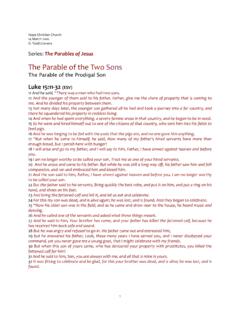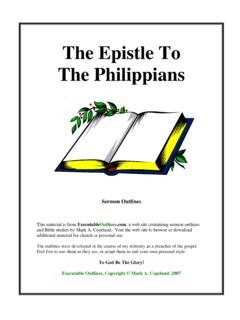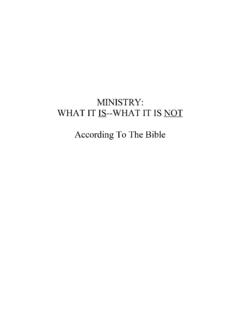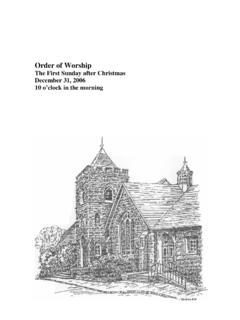Transcription of Psalm 40 - The Practice of Patience - Sermon
1 The Practice of Patience Psalm 40 1 Introduction One morning this past spring as I was driving my youngest son Thomas and his friend Nathaniel to school, we had to stop at a traffic light at the end of the highway exit ramp. This was typical. What wasn t typical was the extended wait at the light. After about one minute waiting, it seemed that the Holy Spirit gave me some insight, and I said to the boys something like this: Boys, I think that God is trying to teach me Patience this morning, so don t worry, I ve got everything under control. After about another minute waiting (it was getting difficult not to keep looking at the clock above my dashboard), I starting thinking that if the light didn t change soon that the boys might be late for school. No problem, I can do this, I thought. God is just teaching me Patience . Well, after about another minute waiting (for a grand total of THREE minutes), I drove through the RED light into the intersection.
2 At that moment, the light turned green, and it was as if the Holy Spirit spoke to my conscience, saying: Michael, you just failed your Patience test. So, I confessed my sin to God, received forgiveness, and then explained to Thomas and Nathaniel how important it is to not be impatient! A few minutes later I dropped off the boys at school .. early! Now, if only all the trials of life were always this simple! The truth is that life is filled with significantly more difficult circumstances that test our Patience , many of which some of you are experiencing today: unemployment, chronic pain, chronic illness, depression, sorrow, addiction, an unbelieving spouse, a broken marriage, unruly children, an overbearing boss, etc. Christians shouldn t be surprised at the presence of difficult circumstances throughout life. For example, consider what James the brother of Jesus once wrote (James 1:2): My brethren, count it all joy when you fall into various trials.
3 James didn t write if, but when, as if to indicate with absolute certainty that if you are a Christian, you should expect to periodically (or perhaps even regularly) experience some form of trial or difficult circumstance that requires the exercise of Patience . So then, the questions I would like to focus on today include: 1. What does it look like to Practice Patience ? 2. Why should we Practice Patience ? 3. How is the Practice of Patience possible? PRAY The Practice of Patience Psalm 40 2 The Context Roughly three thousand years ago the prophet Samuel declared that David was a man after God s own heart (1 Samuel 13:13-14). While this is true, we also know that David was a man whose heart was prone to wander. Whether it was because of David s determination to follow the will of God, or to the folly of his own sinful desires, or the evil intentions of others, David was often in a difficult circumstance.
4 When David was inspired to write Psalm 40, he was reflecting on at least one (but likely several) of these circumstances when he wrote ( Psalm 40:2a): He (God) brought me up out of a horrible pit, out of the miry clay. David was, metaphorically speaking, in a miry pit. It was miry: muddy, sticky, and difficult to maneuver in. And just as Joseph was cast into a literal pit (an empty cistern) and needed someone outside of the pit to free him (Genesis 37), David had experienced some difficult circumstances that required outside intervention. He further explained ( Psalm 40:12): For innumerable evils have surrounded me; My iniquities have overtaken me, so that I am not able to look up; They are more than the hairs of my head; Therefore, my heart fails me. David points to two sources of his difficult circumstances: 1. Innumerable evils had surrounded him.
5 Apparently (see Psalm 40:14), there were many people who sought to destroy his life, who wished him evil. 2. His iniquities had overtaken him. David was painfully aware of his sinful nature and the havoc that it brought into his life. And what was the consequence of this? His heart failed him. Have you ever felt like this? I have. Back in the Fall of 2004, HCC went through a Purpose Driven Life ( PDL ) campaign. Many from HCC were very involved in numerous aspects of the campaign, and I was one of them. For instance, in addition to serving on three ministry teams, I co-hosted a small group Bible study at the Reading Public Library with John Falkenstrom. All things considered, ministry-life was extremely busy. Over the same period of time, my situation at work ( Company X ) had become increasingly complicated. I had come to realize that certain ways in which The Practice of Patience Psalm 40 3 Company X operated were unethical.
6 So, I refrained from some assignments, and tried to engage the executive team in a dialogue in an attempt to change the situation. Consequently, my work-life became increasingly uncomfortable. The day after my first PDL small group, my father (who had been experiencing a decline in health for some time) experienced a seizure of some sort and was hospitalized. Other difficult situations also arose with my personal health and in the lives of my extended family members. Before the PDL campaign ended, I came to believe that my circumstances at work would not change, and that the Lord was prompting me to resign from Company X. After talking and praying with my wife Cris, and despite not having either a new job or a financial cushion, I resigned. A week after the end of the PDL campaign, I was unemployed, and my father had passed away. Call it what you will, but those few weeks and those that followed were extremely difficult: I was physically, mentally, emotionally, and spiritually on the brink.
7 I was in a horrible, miry pit. On top of it all, Cris was really getting tired of bumping into me constantly around the home! Have you ever been in a difficult circumstance, a horrible, miry pit, because of some external source? Or have you ever been in a difficult circumstance as a consequence of your own sin? I would hazard to guess that many of us feel like we re in a miry pit RIGHT NOW. So then, a valid question to ask is this: when facing a difficult circumstance: 1. What does it Look Like to Practice Patience ? In Psalm 40, David explained what he did during his difficult circumstance; he wrote ( Psalm 40:1): I waited patiently for the LORD. By means of application, what should we do in our difficult circumstances? We should wait patiently. But what does it mean to wait patiently? The Hebrew and Greek words behind this phrase provide some insight.
8 (k v '). The Hebrew words used for wait and patiently in this verse are from the same root word, k v ' (kah-vah) (Strong s H6960). This is the only instance of them being used in this way (together) in the entire Old Testament, as if to emphasize the importance of this text. K v ' (kah-vah) implies that to wait patiently involves hope, with anticipation of deliverance. (H -po-me'-n ). The Greek Septuagint likewise uses two forms of h -po-me'-n (hoo-pah-man-oh) (Strong s G5258) for wait patiently in Psalm 40:1. H -po-me'-The Practice of Patience Psalm 40 4 n (hoo-pah-man-oh) is derived from the words h -po (hoo-pah) --- meaning under or underneath --- and me'-n (man-oh) --- meaning to abide. So, the word h -po-me'-n (hoo-pah-man-oh) indicates that to wait patiently involves willfully abiding in subjection and/or submission.
9 (m -kro-th -m '- ). A related word to h -po-me'-n (hoo-pah-man-oh) also often translated as Patience , endurance, or longsuffering is m -kro-th -m '- (ma-craw-thoo-me-ah) (Strong s G3116), which is derived from the words m -kro's (ma-cross) --- meaning long lasting --- and th -mo's (thoo-moss) --- meaning boiling, passionate anger. So then, the word m -kro-th -m '- (ma-craw-thoo-me-ah) indicates that to wait patiently also involves the withholding of anger or retribution for a long time. In many difficult circumstances we have no choice and must wait for relief or the difficult circumstance to end. In some other cases, we could act, perhaps hastily, in an attempt to end the waiting, and often to the detriment of ourselves and/or others. Consider, for example, the patriarch Abraham. While still named Abram and without children, God promised him that his descendents would one day be exceedingly numerous (Genesis 15:1-5).
10 But Abram and Sarai were elderly, they were concerned about not having a son to whom they could bequeath an inheritance, and they had doubts. So, instead of patiently waiting for God s promise to be fulfilled, Abram took Sarai s advice; he took Sarai s maidservant Hagar as a concubine and she bore him a son: Ishmael (Genesis 16:1-16). God didn t fulfill His promise to Abram for another fourteen years (see Genesis 16:16, 17:1, 17:17-19, and 21:5). Abram and Sarai needed to wait patiently for the Lord, but they didn t. The consequence of their impatience and doubt was Ishmael, a boy who would later become the patriarch of twelve tribes whom God said would live in hostility toward every man (Genesis 16:12). Psalm 83 indicates that by the time of David the Ishmaelites were largely hostile toward God and the people of Israel. And so it is to this day. Have you ever acted impatiently, in haste, to the detriment of yourself or others?





